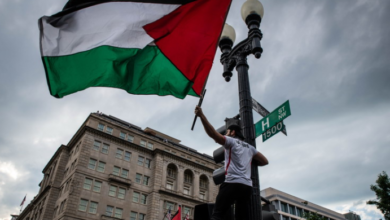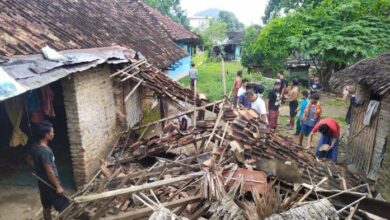The journey of the Prophet's grandson to the archipelago

Kufa, 17 May 660 AD
The political situation at the center of the Islamic government of Kufa was still uncertain after the murder of the caliph Ali bin Abi Talib by a Khawarij named Abdurahman bin Muljam. The Muslims in Kufa urged Hasan bin Ali bin Abi Talib to be willing to take the allegiance as caliph and to defuse the situation.
Qais bin Sa'ad, the commander of the war Ali bin Abi Talib, took Hasan bin Ali's hand [1].
"I pledge against you as caliph, O Hasan," he said aloud.
Ali bin Abi Talib's eldest son gasped in surprise. He also refused. But the pressure of the Islamic ummah was so strong to ask him to become caliph. That day, Hasan ibn Ali officially became caliph after being sworn in at the mosque.
Muawiyah, who was then the governor of Damascus, did not accept Hasan bin Ali's appointment because he was not attended by senior friends who were scattered in various regions. As Governor of Damascus, he also felt more experienced as a government and military leader than Hasan. Muawiyah also refused Hasan's peace invitation; even preparing troops to attack Hasan bin Ali.
At the height of the crisis where the two armies had faced off, Hasan bin Ali, who was soft-tempered, preferred the peaceful path. He did not want the civil war between Muslims in the Shiffin war to repeat itself. The negotiations between Hasan and Muawiyah agreed that Hasan would hand over the government to Muawiyah. Muawiyah must also run a government in accordance with the Koran and Sunnah, maintain safety and not berate Ali bin Abi Talib's family, and may not appoint his successor as caliph, but rather hand over the election of a caliph to the Muslims.
Hasan then chose to stay in Medina until he died in 670 AD
Makkah, 680 AD
Husein bin Ali bin Abi Talib in Makkah the arrival of the resident envoys of Kufa. The messenger explained that the people of Kufa did not like the caliph Yazid bin Muawiyah and assured him that the 100.000 inhabitants of Kufa would take him to become caliph. Yazid's appointment as caliph proves that Muawiyah has broken his promise not to appoint a successor and hand over the election of caliph to the Muslims.
"Go to Kufa and investigate its courage!" said Husayn bin Ali to his cousin Muslim bin 'Aqil.
Yazid bin Muawiyah, who succeeded his father as caliph in Damascus, learned of developments in Kufa and acted quickly. He sent Ubaidillah bin Ziyad to become the new governor of Kufa and secure the city. Ubaidillah captured Muslim bin 'Aqil, suppressed the people of Kufa, and sent troops to intercept Husein.
On that day, October 10, 680 AD, 4.000 troops sent by Ubaidillah attacked Husein bin Ali and the 72 people who were with him in the Karbala field. Husein was also martyred. His head was beheaded and handed over to Ubaidillah [2].
Basyrah, year 928 AD
Imam Ahmad bin Isa, the 9th descendant of Rasulullah from the lineage of Husein bin Ali, decided to move to Medina. The Umayyad Caliphate, which had always considered Ali bin Abi Talib's descendants as a threat, had indeed collapsed. But the Abbasid caliphs in Baghdad also took the same attitude. In order to avoid the dangers that threaten the descendants of the Prophet, Imam Ahmad bin Isa decided to migrate from Basra.
“Basrah is too close to Baghdad. Madinah is safer for our living quarters, ”said Imam Ahmad bin Isa to his family.
While visiting Makkah for Hajj the following year, Ahmad bin Isa met a group of pilgrims from the Yemeni Hadramaut.
“Muslims in Hadramaut will be happy if you migrate and stay in Hadramaut. They also need scholars to strengthen their aqidah from the influence of the Khawarij ideology that is now prevalent there, "said the leader of the Hadramaut haj group.
After the haj pilgrimage in 317 Hijriyah, Imam Ahmad bin Isa again emigrated. This time he took his extended family to the town of Tarim in Hadramaut Yemen until he became known as Ahmad al-Muhajir [3]. His arrival was greeted with joy from the Muslims at Hadramaut. He preached there, and slowly finally eroded the Khawarij understanding and replaced it with the understanding of the Syafii school of ahlus sunnah.
Hadramaut Yemen, 1179 AD
Allawi Amil al-Faqih Muhammad bin Ali gave thanks. On that day his first son was born. He gave him the name Abdul Malik. While growing up, Sayyid Abdul Malik made a new history of the family of the Prophet's descendants. He and part of the Allawiyin family, the surname of the Allawi lineage, emigrated to India. They settled in the city of Nasr Abad, 400 km southwest of New Delhi.
It was also in the city of Nashr Abad that his sons and daughters were born, one of which was Sayyid Abdullah. Sayyid Abdullah's intelligence and breadth of insight about Islam, history, and the countries of the world made him appointed as a diplomat to the Indian sultanate. He also received the knighthood of Khan. Because he also still has the lineage of the Prophet Muhammad, he has the title Sayyid Abdullah Azmatkhan.
Sayyid Abdullah Azmatkhan took advantage of his foreign trips as an opportunity to preach in the countries he visited. History records how he competed with Marcopolo in mainland China. His son, Sayyid Ahmad Syah Azmatkhan, also followed in his father's footsteps to become a diplomat.
Malabar India, 1310 AD
This city on the west coast of India witnessed the birth of a character named Sayyid Husein Jamaludin Akbar Azmatkhan [4]. He was the first child of Sayyid Ahmad Syah Azmatkhan and the 19th generation of Rasulullah from the path of Husein bin Ali bin Abi Talib [5]. Like his father and grandfather, he was also a scholar and royal diplomat who often served various parts of the world.
Sayyid Husein Jamaludin Akbar Azmatkhan has served and preached in Samarkand Uzbekistan for several years. In this mission, he married the daughter of the King of Uzbekistan named Amira Fatimah. From this marriage, he was blessed with 5 children; one of them is Maulana Ibrahim Assamarkandi who as an adult went to preach in the archipelago.
After returning from preaching in Samarkand, Sayyid Husein returned to Delhi. He married the daughter of the Sultan of Delhi Nizamul Muluk. Blessed with 3 children, one of them is Maulana Muhammad al-Baqir. As an adult, Maulana al-Baqir preached in Java and was known as Sheikh Subakir. While establishing diplomatic relations in Morocco, Sayyid Husein Jamaludin Akbar married Laila Fatimah. Blessed with a child named Maulana Muhammad al-Maghribi who also followed in his footsteps of preaching in the archipelago.
In the following periods, Sayyid Husein Jamaludin Akbar Azmatkhan focused on preaching in Southeast Asia. He left with his younger brother Sayyid Thana'uddin and his son who was born in Samarkand Maulana Ibrahim Assamarkandi. The target area is the Champa kingdom, which is located in present-day Laos and Vietnam. His preaching was welcomed by the Champa people. His son, Maulana Ibrahim Asssamarkandi, was finally taken by King Champa's son-in-law. This marriage later gave birth to clerical figures named Sayyid Ali Murtadho and Sayyid Ali Rahmatullah or Sunan Ampel [6].
Da'wah continued to Kelantan Malaysia, Samudera Pasai in Aceh, and Majapahit in East Java. In Kelantan, Husein Jamaludin Akbar married the daughter of Sultan Baki Syah named Puteri Syahirah. Gave birth to 2 children, one of them Sayyid Ali Nurul Alam. Sayyid Ali Nurul Alam is the father-in-law of Nyai Rara Santang, the daughter of Prabu Siliwangi who later gave birth to Syarif Hidayatullah alias Sunan Gunung Jati.
Tuban, 1403 AD
Tuban Harbor that day was filled with large ships from all over the world. As the largest kingdom in the archipelago, Majapahit became a magnet for traders from Arabia, India and China to get spices; one of the most expensive commodities in the world at that time.
Ibrahim Assamarkandi got off the ship that was taking him from Champa. He came to start preaching in Majapahit with his two sons, Sayyid Ali Murtadho and Sayyid Ali Rahmatullah and his nephew Abu Hurairah who was the son of King Champa [7].
“Tubah Port is very busy. Many ships from various countries. Muslim traders from Arabia, India and Malays can also be seen here, ”said Ali Murtadho after getting off the ship.
"Majapahit is no stranger to Islam," said Ibrahim Assamarkandi, "Muslim traders who controlled the sea trade routes had come to Java to buy spices. Some later lived and settled in the port cities of the north coast of Java since the 11th century. Islam has also been embraced by some of the Majapahit royal officials. "
"God willing, we will continue the preaching of previous scholars. Hopefully someday Islam will illuminate Allah's fertile earth, "said Ali Rahmatullah.
"Insha Allah. We will continue the preaching of our predecessor scholars, "said Ibrahim Assamarkandi.
They are not the first delegation scholars to preach in Majapahit. Their predecessor, Husein Jamaludin Akbar, had already preached in Java. In 1371, Maulana Malik Ibrahim also preached in Gresik with several other scholars such as Yusuf Mahrabi and Maulana Mahpur [8].
Sayyid Ali Murtadho then preached in Madura. He was known as Raden Santri and later received the title Raja Pendito Wunut from Raja Majapahit [9]. Sayyid Ali Rahmatullah preached in Surabaya and was known as Sunan Ampel. The Padepokan Ampeldenta he founded even became a character education institution for the government of the princes and the children of Majapahit officials. Sunan Ampel also gave birth to the great scholars of the island of Java, known as Walisongo.
One of Sunan Ampel's students named Raden Paku continued his teacher's da'wah by establishing the Giri Kedaton hermitage which became the largest center of government science education in the archipelago. He is known as Sunan Giri. Sunan Giri's students then spread and taught Islam to remote areas of Java, Kalimantan, Sulawesi, Maluku, Madura and Nusa Tenggara. Many of his students also became kings of the Islamic sultanates of the archipelago after the collapse of Majapahit. [Source: www.fatchuri.com]
...
Historical Short Story by Fatchuri Rosidin.
Fatchuri Rosidin is the Director of IMZ Consulting, a consultant and public speaker in the fields of motivation, human resource development, leadership, parenting, and community empowerment.
NOTE:
[1] Imam Jalaludin Assuyuti. Al-Khulafa date. Egypt. Al-Maktap al-Thaqafy. 2006 [2] HR Bukhari no. 3748 [3] Kholili Hasib. Aqidah School and the History of the Development of Ba'alawi Sufism. Journal of Religious Studies and Islamic Thought Kalimah vol 15 no 1. March 2017 [4] Some literatures mention Sayyid Husein Jamaludin Akbar Azmatkhan born in 1270 [5] Idrus Alwi al-Masyhur. Exposing the Lies of History and the Lineage of the Prophet SAW's Descendants in Indonesia. Saraz Publishing. 2012 [6] Rijal Mumazziq. The footsteps of Uzbek scholars in the archipelago. Falasifa Journal vol 10 no 1. March 2019 [7] Muhammad Kholil in the Punjer Walisongo book mentions Sayyid Ali Murtadho began preaching in Madura in 1403 [8] Agus Sunyoto. Atlas Walisongo. IIMaN Jakarta Library. 2016 [9] Muhammad Kholil & Syafrawi. Phenomenal and Charismatic Ulama Shaykhona Kholil Bangkalan. Journal of Islamic Education and Thought UIM Pamekasan vol 7 no 2. July 2020 [DDHKNews]


